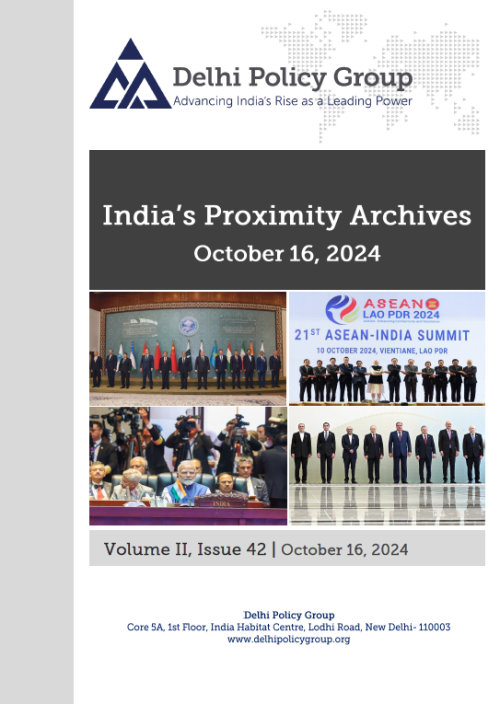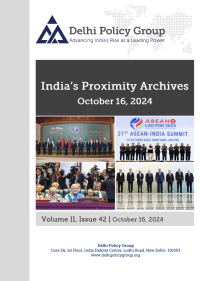India's Proximity Archives
Date: October 16, 2024
South Asia
In response to escalating security concerns caused by terrorist attacks and political unrest nationwide, the federal government of Pakistan allocated a security force of more than 10,000 police and paramilitary personnel to safeguard the safety of around 900 delegates attending the 23rd Shanghai Cooperation Organization summit in Islamabad on October 15 and 16. The summit witnessed the presence of leaders from SCO nations, including Chinese Premier Li Qiang, India’s Minister of External Affairs Dr S Jaishankar, Russia’s Prime Minister Mikhail Mishustin, Iran’s Vice President Mohammad Mokhber, and heads of CAR countries. In his National Statement, Dr S Jaishankar emphasized the value of sincere and transparent dialogue among member states, the role of globalization and rebalancing, the importance of avoiding unilateral agendas, and the need for collaboration.
In response to escalating security concerns caused by terrorist attacks and political unrest nationwide, the federal government of Pakistan allocated a security force of more than 10,000 police and paramilitary personnel to safeguard the safety of around 900 delegates attending the 23rd Shanghai Cooperation Organization summit in Islamabad on October 15 and 16. The summit witnessed the presence of leaders from SCO nations, including Chinese Premier Li Qiang, India’s Minister of External Affairs Dr S Jaishankar, Russia’s Prime Minister Mikhail Mishustin, Iran’s Vice President Mohammad Mokhber, and heads of CAR countries. In his National Statement, Dr S Jaishankar emphasized the value of sincere and transparent dialogue among member states, the role of globalization and rebalancing, the importance of avoiding unilateral agendas, and the need for collaboration.
Southeast Asia
The 21st ASEAN-India Summit was convened in Vientiane, Lao PDR, on October 10. The meeting was chaired by the Prime Minister of the Lao People’s Democratic Republic, Sonexay Siphandone. Prime Minister Modi made his 11th participation at the Summit. In his remarks, he unveiled a 10-point plan to enhance the ASEAN-India partnership. This includes organizing the ASEAN-India Women Scientists Conclave, doubling the number of scholarships at Nalanda University, reviewing the ASEAN-India Trade in Goods Agreement, enhancing disaster resilience, establishing a new Health Ministers’ track, launching the ASEAN-India Cyber Policy Dialogue, conducting a workshop on Green Hydrogen, and urging ASEAN Leaders to join the ‘Plant a Tree for Mother’ campaign.
East Asia
The 19th East Asia Summit (EAS) was convened on October 11. During his address, PM Modi stressed ASEAN’s central role in the Indo-Pacific regional architecture, in India’s Indo-Pacific Vision and in Quad cooperation. PM Modi also underlined the severe impact of conflicts on the Global South and highlighted that the path of dialogue and diplomacy based on a humanitarian approach must be adopted for the peaceful resolution of conflicts in the world. PM Modi stressed that terrorism, along with cyber and maritime challenges, posed a serious threat to global peace and security, for which countries must come together to combat them. Russia and China were reported to have blocked a proposed consensus statement by the EAS mainly over objections to language on the contested South China Sea.
West Asia
Following injuries to two peacekeepers of the United Nations Interim Force in Lebanon (UNIFIL) on October 10, the UN and India urged the Israeli Defence Forces to ensure the safety and security of UNIFIL personnel. While the IDF expressed deep concern over the injured peacekeepers, the UNIFIL pledged to remain in all its positions, including those near the Israeli-Lebanese border. Amidst this, on October 9, US President Joe Biden spoke with Israeli Prime Minister Benjamin Netanyahu reaffirming America’s “ironclad commitment” to Israel’s defence and security. To defend Israel from attacks by Iran and Iran-aligned militias, the US has deployed a Terminal High Altitude Area Defence (THAAD) missile battery to Israel.
Central Asia
Russian President Vladimir Putin began his visit to Turkmenistan on October 11, speaking at the plenary meeting of the ‘Interrelation of Times and Civilisations – Basis of Peace and Development international forum’. The conference was attended by other regional leaders, including Iranian President Masoud Pezeshkian, Pakistani President Asif Ali Zardari and the heads of the other Central Asian nations. During President Putin’s opening remarks, he stated that he wants to build “a new world order” with Russia’s friends and partners. On the sidelines, President Putin held separate meetings with President of Iran Masoud Pezeshkian and the national leader of the Turkmen people, Speaker of Halk Maslahaty (People’s Council) of Turkmenistan Gurbanguly Berdimuhamedov.
Indian Ocean Region
On October 14, 2024, India and Australia held their 4th 2 2 Secretary-level Consultations in New Delhi. The meeting was co-chaired by Indian Defence Secretary Giridhar Aramane and Foreign Secretary Vikram Misri, alongside Australian officials, Defence Secretary Greg Moriarty and Secretary of the Department of Foreign Affairs and Trade Jan Adams. The consultations aim to strengthen ties and enhance bilateral cooperation in fora such as Quad and G20. Both sides reiterated their commitment to further advance the India-Australia Comprehensive Strategic Partnership and shared vison of peace, prosperity, stability, and progress in the Indo-Pacific region.



